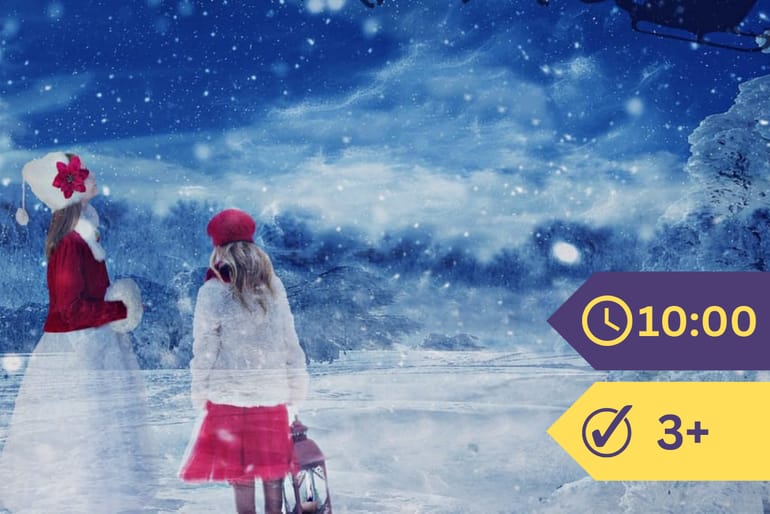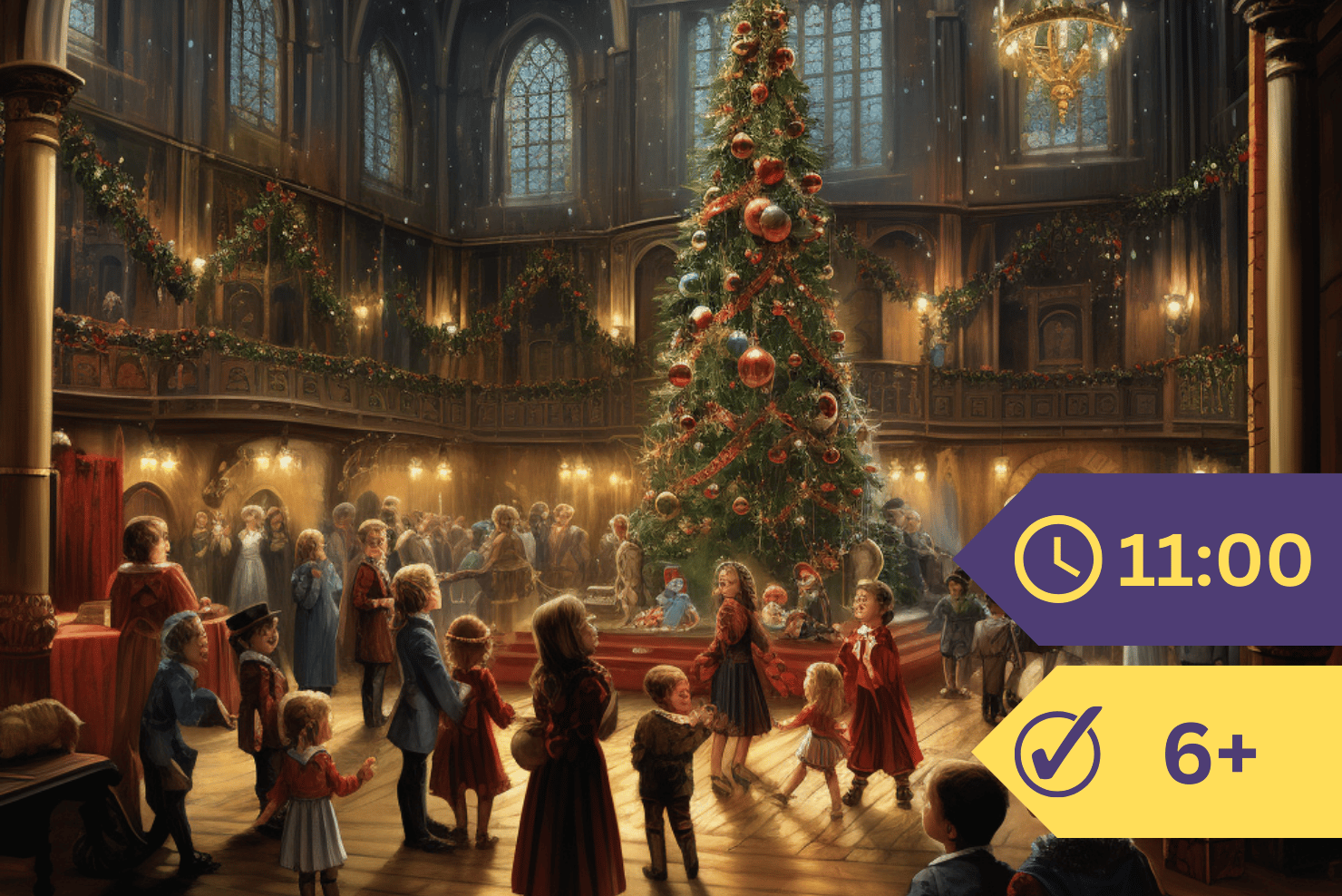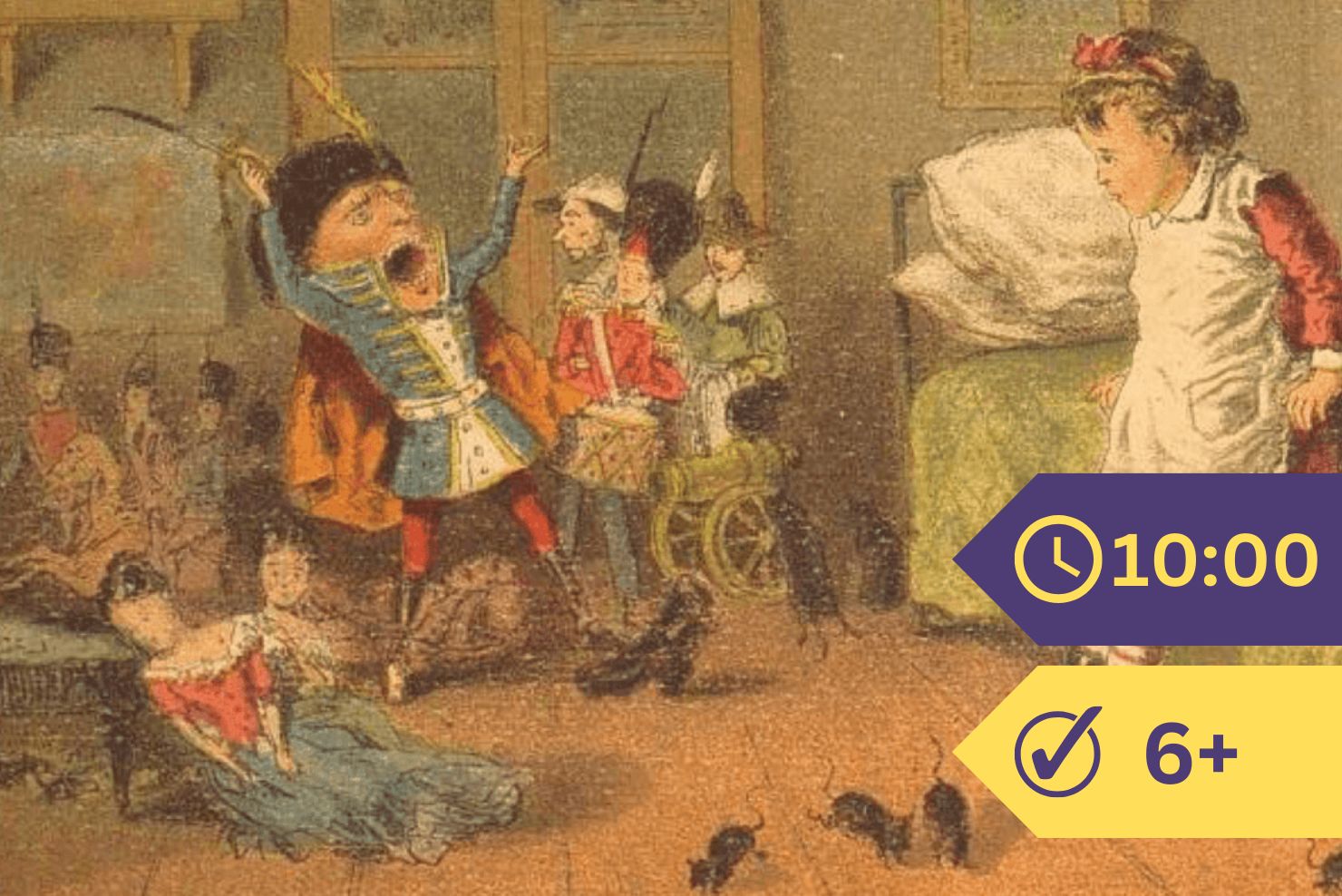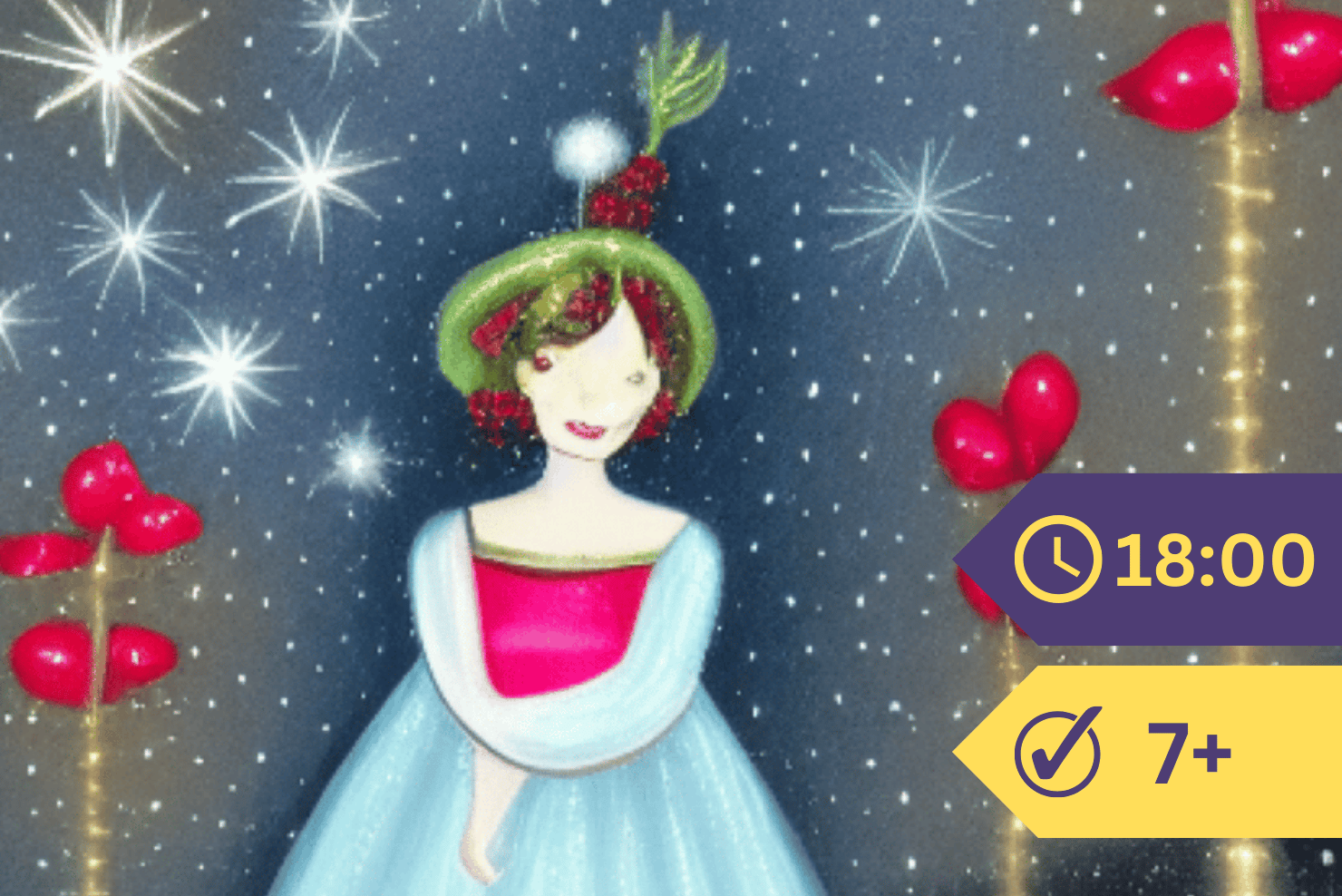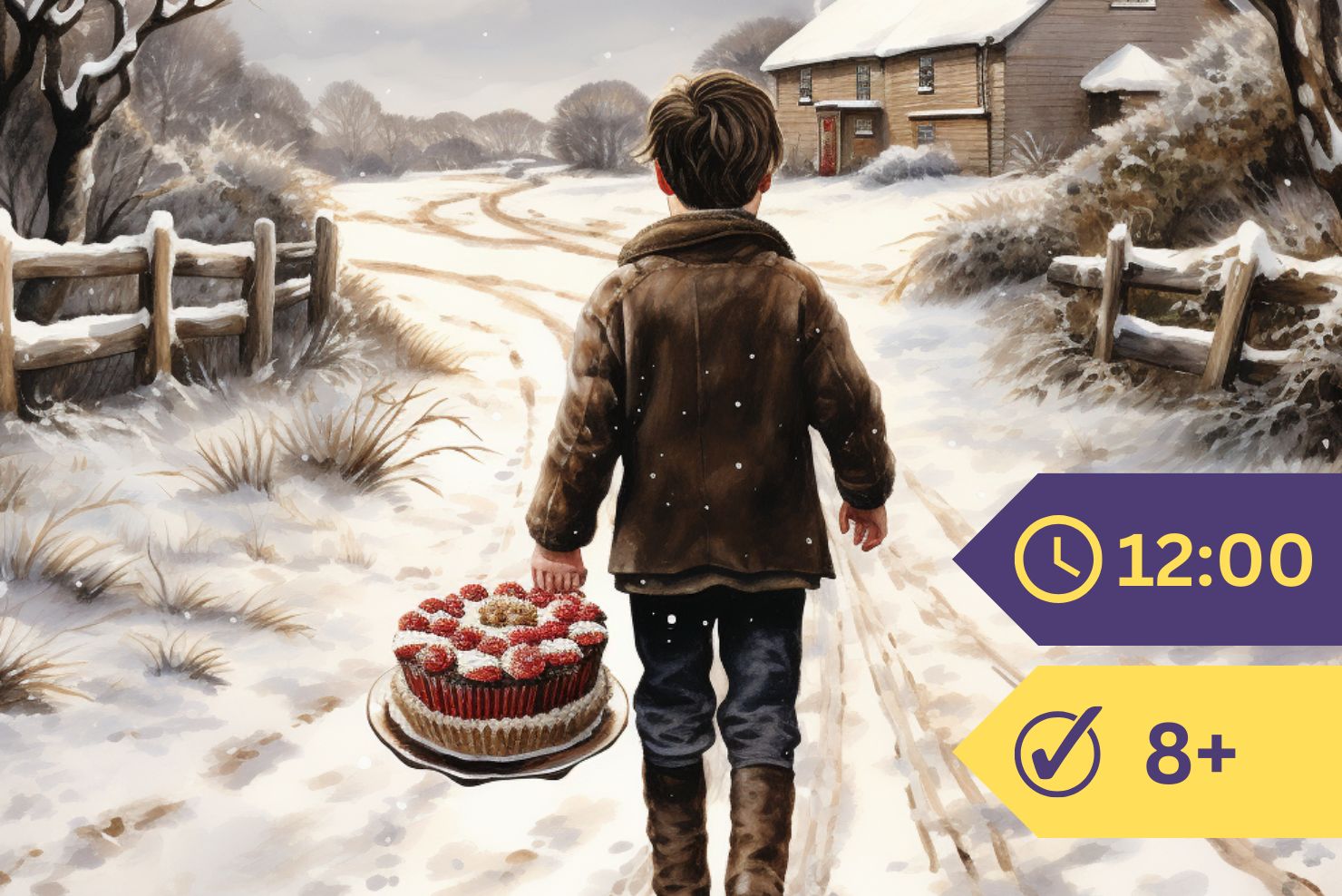Once upon a time, a long time ago, far away across the great ocean, in a country called Germany, there was a small log hut on the edge of a great forest, whose fir trees extended for miles and miles to the north. This little house, made of heavy logs, only had one room. A rough pine door gave entrance to this room, and there was a small square window. At the back of the house was built an old-fashioned stone chimney, out of which in winter curled a thin, blue smoke, showing that there was not very much fire within.
Small as the house was, it was large enough for two people who lived in it. I want to tell you a story today about these two people. One was an old gray-haired woman, so old that the little children of the village, nearly half a mile away, often wondered whether she had come into the world with the huge mountains and the giant fir trees. Her face was wrinkled all over with deep lines. None of them were scared of her, for her smile was always cheerful, and she had kind words for each of them if they met her on her way to and from the village. With this old, old woman lived a very little girl. So bright and happy was she that the travellers who passed by the lonesome little house on the edge of the forest often thought of a sunbeam as they saw her. These two people were known in the village as Granny Goodyear and Little Gretchen.
The winter had come. Gretchen and her granny were up by daybreak each morning. After their simple breakfast of oatmeal, Gretchen would run to the little closet and fetch Granny’s old woolen shawl. After carefully pinning it under Granny’s chin, she gave her a good-bye kiss, and Granny started out for her morning’s work in the forest. This work was nothing more than gathering twigs and branches which the autumn winds and winter frosts had thrown on the ground. Then she went to the village market. Here she sold the twigs to the people. Sometimes she would get only a few pence each day, and sometimes a dozen or more, but on this money little Gretchen and she managed to live; they had their home, and the forest kindly furnished the wood for the fire which kept them warm in winter.
Sometimes, when the weather was fine, Granny would let little Gretchen go along with her. One of these trips to the town came just the week before Christmas, and Gretchen’s eyes were delighted by the sight of the lovely Christmas trees which stood in the window of the village store. It seemed to her that she would never tire of looking at the knit dolls, the woolly lambs and all the other fine things. She had never owned a toy in her whole life; therefore, toys which you and I would not think much of seemed to her very beautiful.
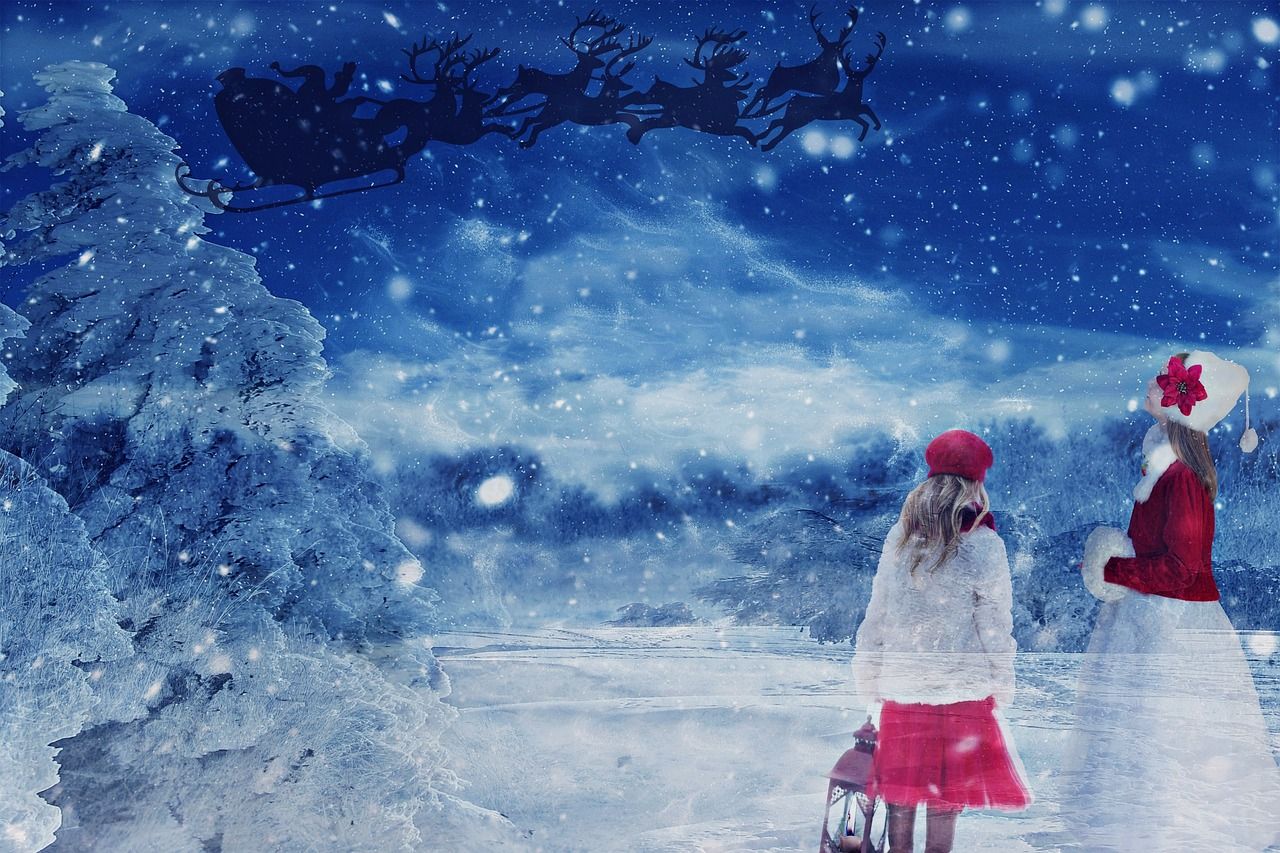
That night, after their dinner of baked potatoes was over, and little Gretchen had cleared away the dishes and swept up the fireplace, because Granny dear was so tired, she brought her own little wooden stool and placed it very near Granny’s feet and sat down upon it, folding her hands on her lap. Granny knew that this meant that she wanted to be told about something.
“Granny,” said Gretchen slowly, “It’s almost Christmas time, isn’t it?”
“Yes, dearie,” said Granny, “only five days more now,” and then she sighed, but little Gretchen was so happy that she did not notice Granny’s sigh.
“What do you think, Granny, I’ll get this Christmas?” said she, looking up eagerly into Granny’s face.
“Ah, child, child,” said Granny, shaking her head, “you’ll have no Christmas this year. We are too poor for that.”
“Oh, but Granny,” interrupted little Gretchen, “think of all the beautiful toys we saw in the village today. Surely Santa Claus has sent enough for every little child.”
“Ah, dearie, those toys are for people who can pay for them, and we have no money to spend for Christmas toys.”
“Well, Granny,” said Gretchen, “perhaps some of the little children who live in the great house on the hill at the other end of the village, will be willing to share some of their toys with me. They will be glad to give some to a little girl who has none.”
“Dear child, dear child,” said Granny, leaning forward and stroking the soft, shiny hair of the little girl, “your heart is full of love. You would be glad to bring a Christmas to every child; but their heads are so full of what they are going to get that they forget all about anybody else but themselves.” Then she sighed and shook her head.
“Well, Granny,” said Gretchen, her bright, happy tone of voice growing a little less joyous, “perhaps the dear Santa Claus will show some of the village children how to make presents that do not cost money, and some of them may surprise me Christmas morning with a present. And, Granny, dear,” added she, springing up from her low stool, “can’t I gather some of the pine branches and take them to the old sick man who lives in the house by the mill, so that he can have the sweet smell of our forest in his room all Christmas day?”
“Yes, dearie,” said Granny, “you may do what you can to make the Christmas bright and happy, but you must not expect any present yourself.”
Granny sighed as she half whispered. “Poor child, poor child!” but Gretchen threw her arm around Granny’s neck and gave her a hearty kiss. Then she danced all around the room, whirling her little skirts about her to show Granny how the wind had made the snow dance that day. She looked so happy and funny that Granny forgot her cares and worries and laughed with little Gretchen over her new snow dance. The days passed and the morning before Christmas Eve came. Gretchen was off to the forest, singing a birdlike song, almost as happy and free as the birds themselves. She was very busy that day preparing a surprise for Granny. First, however, she gathered the most beautiful of the fir branches within her reach to take the next morning to the old sick man who lived by the mill.
The day was all too short for the happy little girl. When Granny came trudging wearily home that night, she found the frame of the doorway covered with green pine branches.
“It is to welcome you, Granny!” cried Gretchen; “our dear old home wanted to give you a Christmas welcome. Don’t you see, the branches of the evergreen make it look as if it were smiling all over, and it is trying to say, ‘A happy Christmas to you Granny’.”
Granny laughed and kissed the little girl, as they opened the door and went in together. Gretchen laughed and clapped her hands and danced about until the house seemed full of music to poor, tired Granny, whose heart had been sad as she turned toward their home that night, thinking of the disappointment that must come to loving little Gretchen the next morning.
When Gretchen went to bed that night she said, “Granny, don’t you think that somebody in all this wide world will think of us tonight?”
“Gretchen, I do not think any one will.”
“Well” said Gretchen, “just to be sure we don’t miss any presents. I will put our wooden shoes by the door, maybe Santa will put something in it.”
“Ah, you foolish, foolish child,” said Granny, “you are only getting ready for a disappointment. Tomorrow morning there will be nothing in the shoe. I can tell you that now.”
Gretchen went outside with the shoes, just then a rough wind went sweeping by the little girl, whispering something to her which she could not understand, and then it made a sudden rush up to the snow clouds and parted them, so that the deep mysterious sky appeared beyond, and shining down out of the midst of it was Gretchen’s favorite star.
“Ah, little star!” said the child, laughing aloud, “I knew you were there, though I could not see you. Will you whisper to the Christmas angels as they come by that little Gretchen wants so very much to have a Christmas gift tomorrow morning?”
The next morning, very early, even before the sun was up, little Gretchen was awakened by the sound of sweet music coming from the village. She listened for a moment and then she knew that the choir boys were singing the Christmas carols in the open air of the village street. She sprang up out of bed and began to dress herself as quickly as possible, singing as she dressed. While Granny was slowly putting on her clothes, little Gretchen having finished dressing herself, unfastened the door and hurried out to see what the Christmas angels had left in the old wooden shoe.
The white snow covered everything—trees, stumps, roads, and pastures—until the whole world looked like fairy land. Gretchen went outside to see if anything was in the shoe.
“Oh, Granny, Granny!” she exclaimed; “you did not believe the Christmas angels would think about us, but see, they have, they have! Here is a dear little bird nestled down in the toe of your shoe! Oh, isn’t he beautiful?”
Granny came forward and looked at what the child was holding lovingly in her hand. There she saw a tiny chick-a-dee, whose wing was evidently broken by the rough and boisterous winds of the night before, and who had taken shelter in the safe, dry toe of the old wooden shoe. She gently took the little bird out of Gretchen’s hands, and skilfully bound his broken wing to his side, so that he need not hurt himself trying to fly with it. Then she showed Gretchen how to make a nice warm nest for the little stranger, close beside the fire and when their breakfast was ready, she let Gretchen feed the little bird with a few moist crumbs.
Later in the day Gretchen carried the fresh, green boughs to the old sick man by the mill, and on her way home stopped to enjoy the Christmas toys of some other children that she knew, never once wishing they were hers. As Granny and she got ready for bed that night, Gretchen put her arms softly around Granny’s neck, and whispered: “What a beautiful Christmas we have had today, Granny. Is there anything more lovely in all the world than Christmas?”
“No, my child,” said Granny, “not to such loving hearts as yours.”

